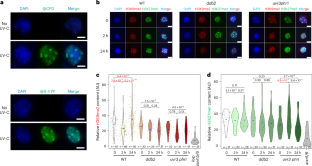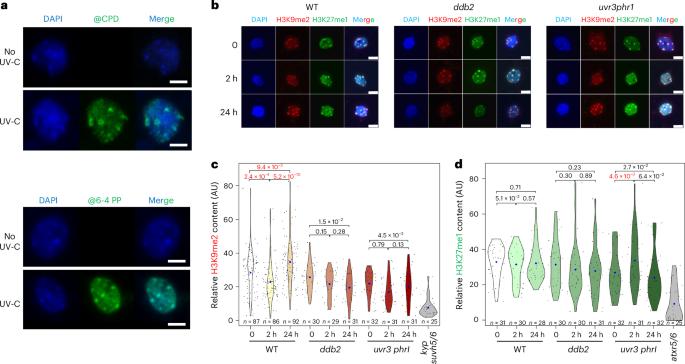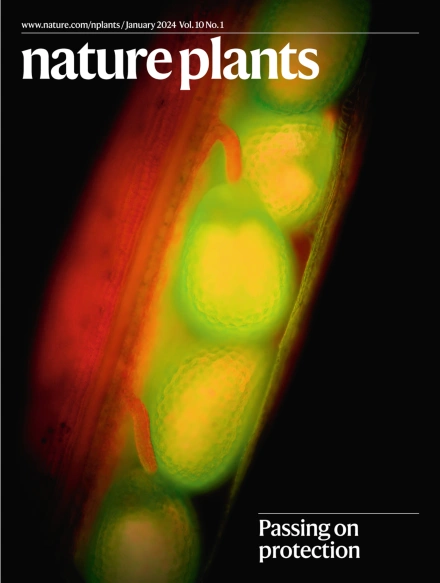The histone demethylase JMJ27 acts during the UV-induced modulation of H3K9me2 landscape and facilitates photodamage repair
IF 15.8
1区 生物学
Q1 PLANT SCIENCES
引用次数: 0
Abstract
Plants have evolved sophisticated DNA repair mechanisms to cope with the deleterious effects of ultraviolet (UV)-induced DNA damage. Indeed, DNA repair pathways cooperate with epigenetic-related processes to efficiently maintain genome integrity. However, it remains to be deciphered how photodamages are recognized within different chromatin landscapes, especially in compacted genomic regions such as constitutive heterochromatin. Here we combined cytogenetics and epigenomics to identify that UV-C irradiation induces modulation of the main epigenetic mark found in constitutive heterochromatin, H3K9me2. We demonstrated that the histone demethylase, Jumonji27 (JMJ27), contributes to the UV-induced reduction of H3K9me2 content at chromocentres. In addition, we identified that JMJ27 forms a complex with the photodamage recognition factor, DNA Damage Binding protein 2 (DDB2), and that the fine-tuning of H3K9me2 contents orchestrates DDB2 dynamics on chromatin in response to UV-C exposure. Hence, this study uncovers the unexpected existence of an interplay between photodamage repair and H3K9me2 homeostasis. UV exposure modulates H3K9me2 contents at chromocentres via the histone demethylase JMJ27 which interacts with the DNA damage recognition factor, DDB2, and facilitates photodamage repair. The loading or release of DDB2 at nucleosome sites is optimized by the fine-tuning of H3K9me2.


组蛋白去甲基化酶 JMJ27 在紫外线诱导的 H3K9me2 景观调节过程中发挥作用,并促进光损伤修复
植物进化出了复杂的 DNA 修复机制,以应对紫外线(UV)引起的 DNA 损伤的有害影响。事实上,DNA 修复途径与表观遗传相关过程合作,有效地维护了基因组的完整性。然而,光损伤是如何在不同的染色质景观中被识别的,尤其是在紧密的基因组区域,如组成型异染色质中,仍有待破译。在这里,我们将细胞遗传学和表观基因组学结合起来,发现紫外线-C 照射会诱导改变构成型异染色质中的主要表观遗传标记 H3K9me2。我们证明,组蛋白去甲基化酶 Jumonji27(JMJ27)有助于紫外线诱导的染色体中心 H3K9me2 含量的减少。此外,我们还发现 JMJ27 与光损伤识别因子 DNA 损伤结合蛋白 2(DDB2)形成复合物,而 H3K9me2 含量的微调是 DDB2 在染色质上响应紫外线-C 暴露的动态协调。因此,这项研究发现了光损伤修复与 H3K9me2 平衡之间意想不到的相互作用。
本文章由计算机程序翻译,如有差异,请以英文原文为准。
求助全文
约1分钟内获得全文
求助全文
来源期刊

Nature Plants
PLANT SCIENCES-
CiteScore
25.30
自引率
2.20%
发文量
196
期刊介绍:
Nature Plants is an online-only, monthly journal publishing the best research on plants — from their evolution, development, metabolism and environmental interactions to their societal significance.
 求助内容:
求助内容: 应助结果提醒方式:
应助结果提醒方式:


